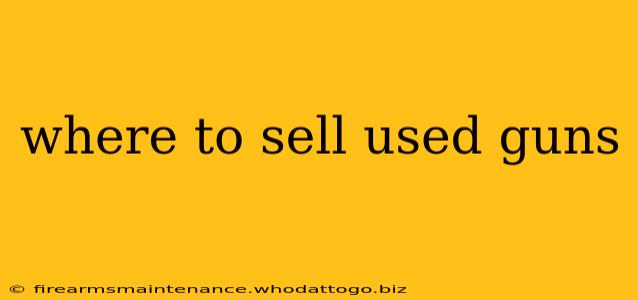Selling a used firearm can be a complex process, requiring careful consideration of legality and safety. This guide outlines the various options available, emphasizing the importance of adhering to all local, state, and federal regulations. Always prioritize safety and legal compliance.
Understanding the Legalities of Selling Firearms
Before exploring sales avenues, it's crucial to understand the legal landscape. Regulations vary significantly by location, so researching your specific area's laws is paramount. Key factors to consider include:
- Background checks: Most jurisdictions require licensed dealers to conduct background checks on all firearm purchasers. Private sales often have different regulations, which might involve a licensed dealer acting as an intermediary.
- Registration: Some states mandate firearm registration. Understanding your state's requirements is vital to avoid legal penalties.
- Prohibited sales: Certain individuals are legally prohibited from owning firearms. Knowing these restrictions is crucial to ensure you are not selling to someone who cannot legally possess a firearm.
- Permits: You may need specific permits or licenses to sell firearms, depending on your location and the type of firearm.
Disclaimer: This information is for general guidance only and does not constitute legal advice. Consult with a legal professional specializing in firearms regulations in your jurisdiction for definitive answers.
Options for Selling Used Guns
Several avenues exist for selling used firearms, each with its own advantages and disadvantages:
1. Licensed Gun Dealers
- Pros: Handles all necessary paperwork and background checks, ensuring legal compliance. Offers a convenient and relatively safe transaction process.
- Cons: Generally pays less than private sales due to their overhead and profit margins.
2. Online Gun Marketplaces
- Pros: Wide reach, potentially attracting more buyers.
- Cons: Increased risk of scams and fraudulent transactions. Requires careful vetting of potential buyers and adherence to platform rules. Shipping firearms can be complex and expensive, and requires adherence to strict regulations.
3. Pawn Shops
- Pros: Quick and easy transaction, often offering immediate cash.
- Cons: Typically offers lower prices than other options.
4. Private Sales
- Pros: Potential for higher sale prices compared to other methods.
- Cons: Requires managing all aspects of the transaction, including background checks (where applicable), paperwork, and meeting with potential buyers. Significant safety concerns are involved; careful planning and precautions are essential.
Safety Considerations When Selling Firearms
Safety should be your top priority throughout the entire sales process:
- Secure storage: Keep your firearm securely stored until the sale is complete.
- Meet in a safe public place: Avoid meeting potential buyers at your home or in isolated locations. Public places like gun shops or police stations can be safer alternatives.
- Thorough buyer vetting: Verify the buyer's identity and ensure they are legally allowed to purchase a firearm.
- Handle the firearm carefully: Always maintain safe gun handling practices.
Conclusion
Selling used firearms requires careful planning, adherence to legal regulations, and a strong emphasis on safety. Choose the sales method that best balances convenience, price, and safety for your specific situation. Remember to consult with legal professionals and relevant authorities to ensure complete compliance with local, state, and federal laws. Prioritizing safety throughout the process is crucial to prevent accidents and legal repercussions.

